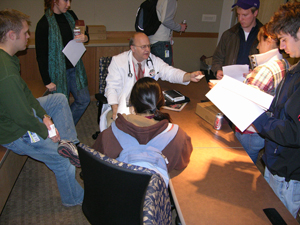 |
Ed Vandenberg, M.D., talks to first-year medical students about the aging and integrated medicine Enhanced Medical Education Track. The application process for the enhanced tracks begins Dec. 1. |
The meeting allowed the students to learn more about the tracks, which will allow select medical students to undertake in-depth studies of interdisciplinary fields while they also complete the required medical school curriculum.
This is the first year UNMC has offered EMETs, which are available at just a handful of medical schools around the country.
“We wanted students to get to meet the directors and to learn more about what would be expected of them should they enter one of the tracks,” said Hugh Stoddard, Ph.D., assistant dean for medical education in the College of Medicine.
|
Students can apply to participate in the following EMETs (track directors are listed in parenthesis):
- Aging and integrated medicine (Ed Vandenberg, M.D.);
- Auto-immune diseases (Geoffrey Thiele, Ph.D.);
- Comprehensive HIV medicine (Miguel Madariaga, M.D.);
- Preventive medicine (Jim Medder, M.D.); and
- Underserved health care (Jim Medder, M.D.).
Although EMET participants are required to maintain good academic standing, Dr. Stoddard said participants will be selected based on their interest in the topic and their motivation to complete work above and beyond the basic M.D. curriculum.
“We want you to apply to a track that is relevant to your passion,” Dr. Stoddard told the students who attended the meeting.
Once the application process is finished, track participants will be selected and will start work on their track in early 2009.
Participants will complete the designated EMET activities such as seminars, preceptorships or research, throughout their M1, M2 and M3 years.
During the M4 year, participants will produce a capstone project such as a poster or conference presentation with the help of their mentors.
Successful completion of EMETs will be noted in students’ Medical School Performance Evaluation (Dean’s Letter), transcripts and also during the College of Medicine’s annual awards convocation.
Contact Dr. Stoddard at hstoddard@unmc.edu or 559-7837 for more information.